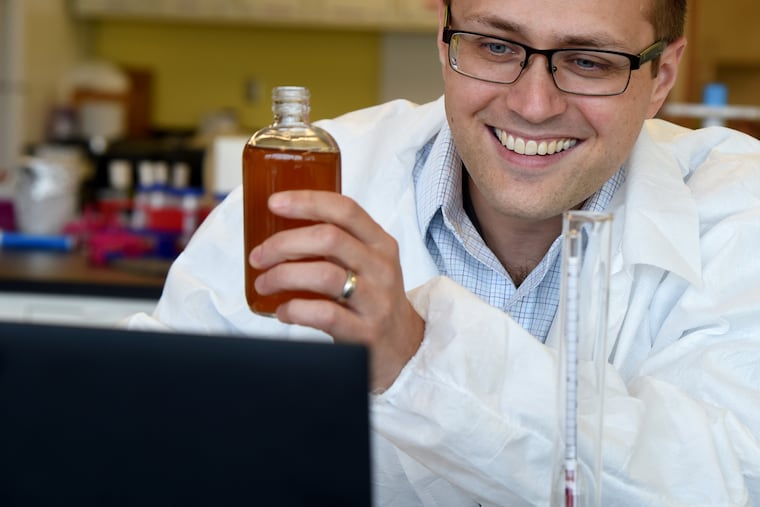How to conduct an engaging lab experiment in the time of COVID: Brew beer
Around the country, lab professors who can’t work with students in person are trying ways to get over the hurdle. One local professor found the answer in the science of beer brewing.

The 22 students in the La Salle University microbiology class had been brewing their first batch of beer for the last two weeks, and it was time to taste it.
Senior Austin Taylor, participating on the class Zoom call, took a swig from his jar and grimaced.
“Oh, oh, that’s gross,” the senior biology major from Woodbridge, N.J., said, putting his hand over his mouth as if he wasn’t sure he could swallow it. “That was nasty. I don’t recommend that.”
His teacher, assistant professor Brian DeHaven, laughed and told him not to worry. “So was mine,” DeHaven said.
Brewing the perfect beer on the first try could be a byproduct of DeHaven’s class, called “Bootleg Biology,” but it’s not the goal. The aim is the scientific lessons that brewing offers. Students are mixing their hops and malt. They’re growing or “capturing” their own yeast, a process DeHaven adapted from a grower’s website. They’re measuring the changes in density of the liquid, which allows them to calculate alcohol content and carbohydrates. Then they’re hypothesizing and figuring out how to adjust their process to improve the product.
“I didn’t know how much science was actually involved in beer-making,” said Morgan O’Donnell, 22, a biology major from Yardley.
» READ MORE: Teaching coronavirus: Some college professors have written it into their lesson plans
DeHaven has been teaching brewing for several years; COVID-19 presented the hurdle of not being able to do it in person, a challenge for any lab professor. Most of La Salle’s classes are online this semester, with limited exceptions in areas such as nursing and health sciences. DeHaven conducted last week’s class from his lab for the first time since the pandemic started. Students participated virtually from their homes. They had previously picked up their lab supplies from the university or a local home-brew store.
“It’s a little hard for me to troubleshoot this year,” DeHaven said. “If I can taste it, I can usually offer some advice.”
Around the country, lab professors who can’t work with students in person are trying ways to get over the hurdle.
At the University of Pennsylvania, where almost all instruction is virtual this semester, biology instructors put together and mailed hundreds of lab kits with pocket microscopes, Petri dishes, slides, and other materials to students. Kits went to states as far away as California and to several other countries, including Canada, England, France, and South Korea. The kits will allow students to look at the enzymes in carrots, study the photosynthesis process, analyze DNA, and measure the respiration of germinating peas.
“It’s important to get students off of their computers and using some of the tools and techniques that are used by scientists,” said Linda Robinson, an instructional laboratory coordinator.
» READ MORE: At Ursinus College, all students are tested for the coronavirus every week
Still, it’s a challenge for students to conduct experiments without having teachers in the lab to guide them, she said. Professors are demonstrating experiments and students are working in groups, so they can help each other, she said.
At La Salle, students in DeHaven’s class said the lab has been one of their favorites.
“The difference between this class and other classes is the amount of participation I can bring," said Maya Moore, a biology major from Egg Harbor Township, N.J. “I feel more involved. I feel like I’m learning more in this class.”
Beer brewing is a natural for a microbiology lab, DeHaven said.
“Even as things go wrong, even as their pots boil over," DeHaven said, "I think all of us have just really enjoyed the chance to do something.”
A few students aren’t 21 and had to have a parent or older roommate agree to store and taste for them. Tasting is a small part of the class, DeHaven said, and students are only brewing about 8 ounces each time.
Moore is 20, so her roommate, who is 21, did the honors.
“She said it was like a strong Miller Lite,” Moore said, noting it had a 7.3% alcohol content.
Gia Citrino, 21, a biology major from Bellmawr, Camden County, was too nervous to try the beer in class but shared it with her father later and sent a video of the moment to DeHaven.
Her look of disgust just about matched that of Taylor’s. Her alcohol content was about 1.6%.
“It actually tastes like beer, though,” her father said, encouragingly. “It’s not good beer.”
“No, it’s not good beer,” Citrino agreed.
O’Donnell ran into technical difficulties when she prepared her ingredients.
She had used too small a pot on a big burner. Now her beer tasted like water.
But that didn’t deter her.
“My beer had the lowest alcohol content out of everyone in the class, but I think I had the most fun,” she said.
Students will brew at least two more batches this semester.
O’Donnell is excited to apply what she’s learned.
“I’m changing the pot," she said. “I’m changing the burner. I’m going to have a measuring cup. … I’m going to take a totally different approach.”